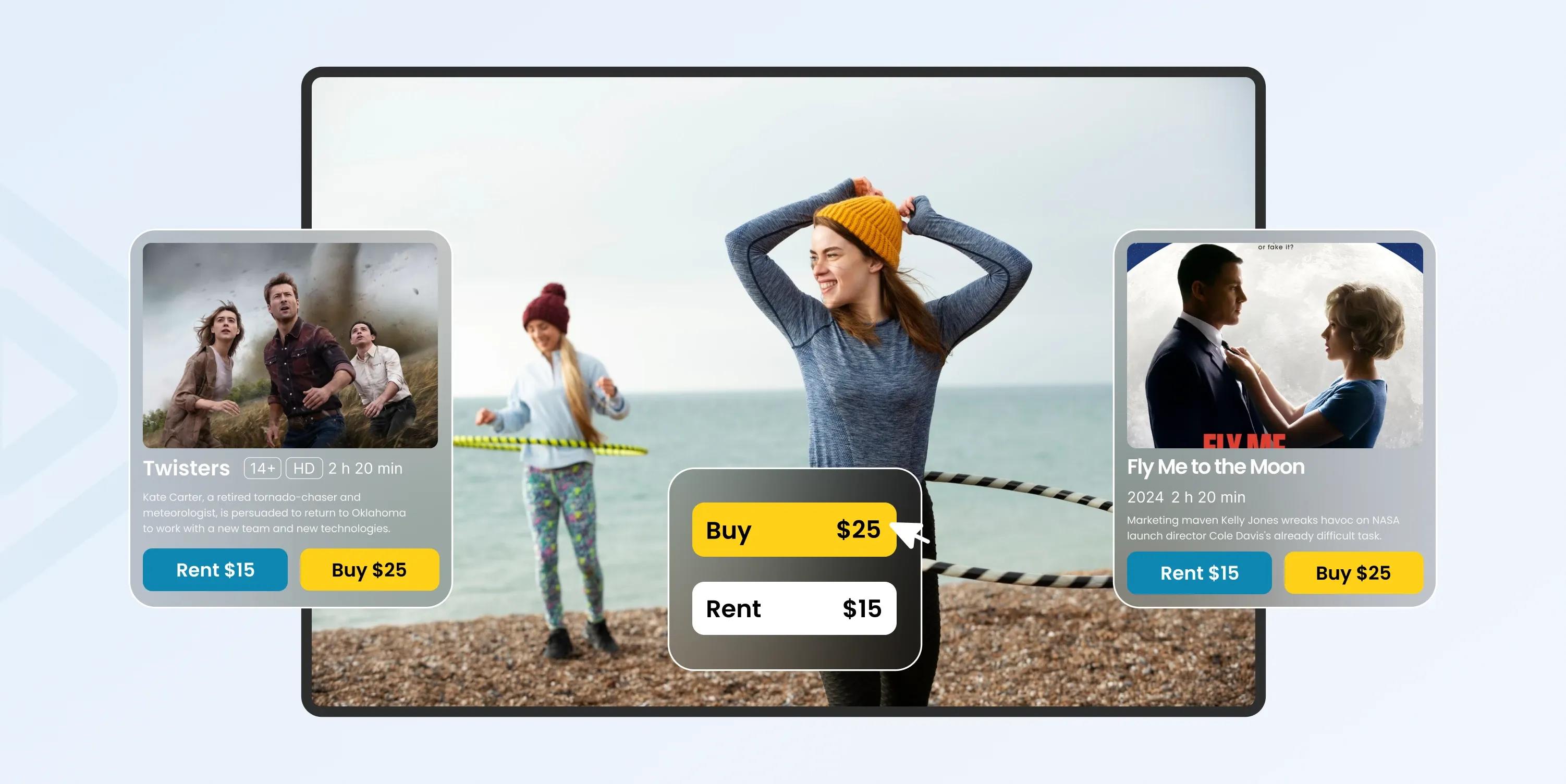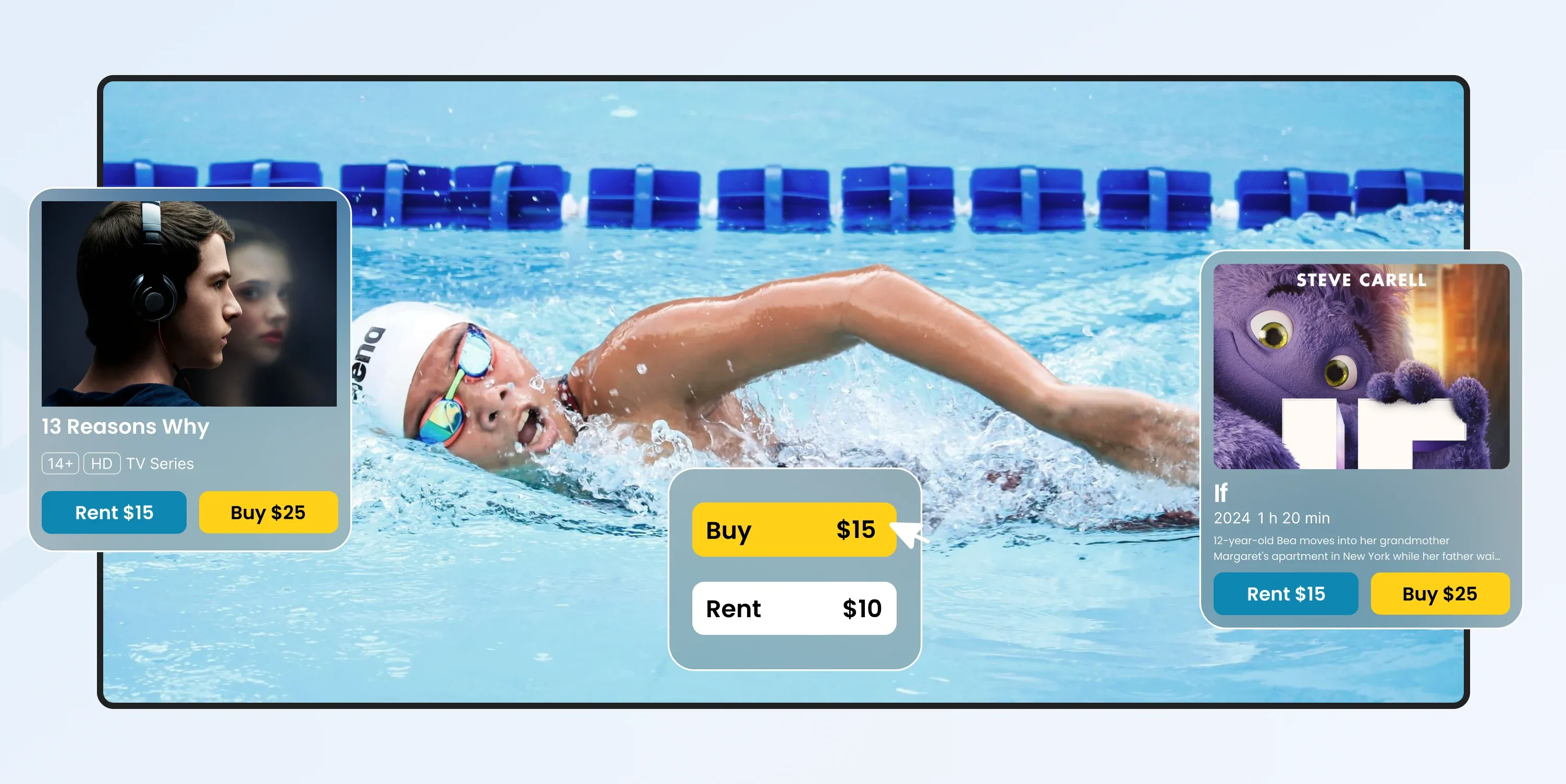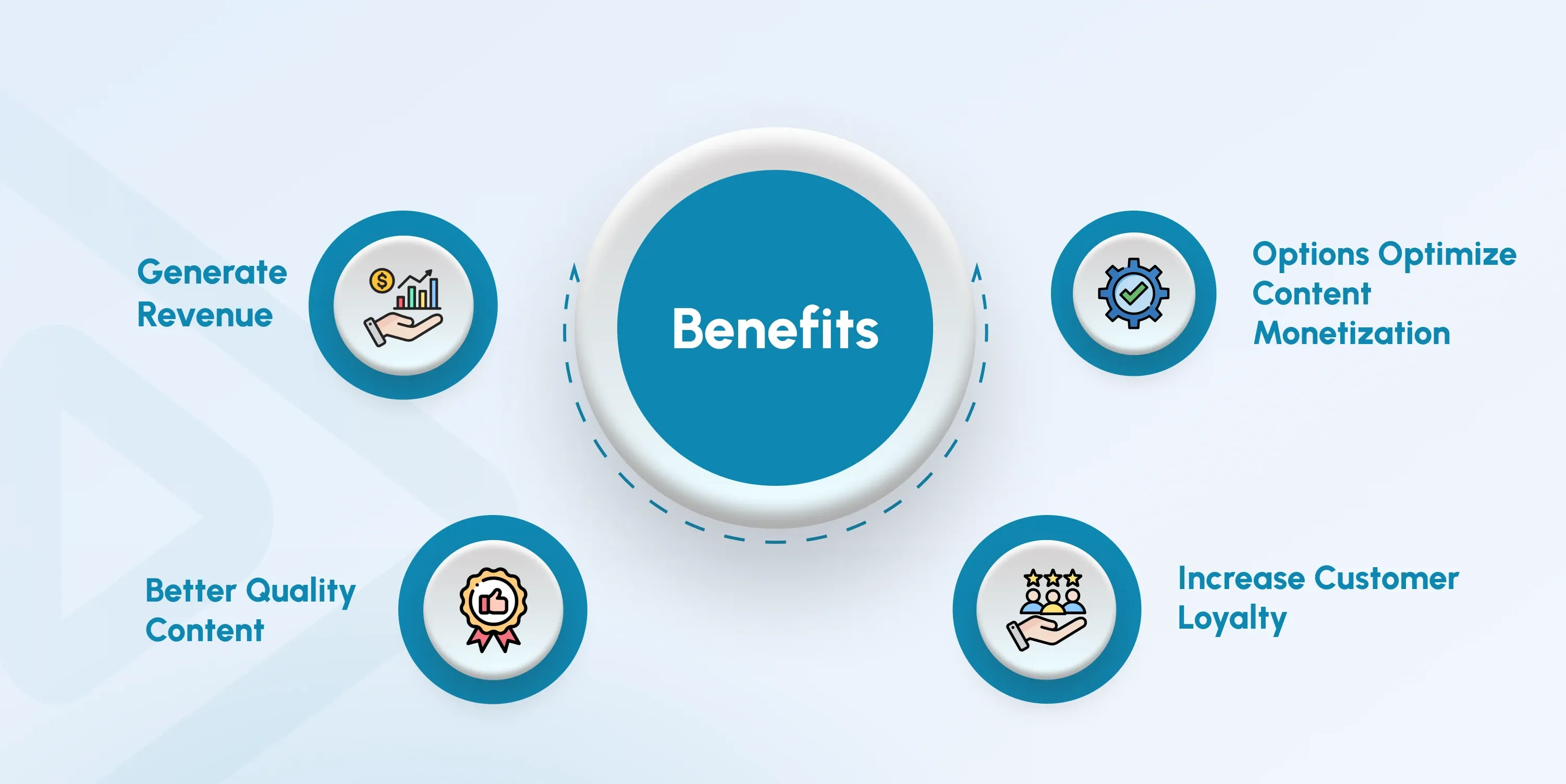
What is a Video Paywall? Benefits and Best Practices
The most effective tool that OTT and IPTV providers use for monetization is a video paywall. This allows content owners to control access to their videos and charge users for using the content.
Paywalls offer the flexibility to monetize content using subscriptions, pay-per-view, or a mix of free and paid offerings. Plus, with a video paywall, you can protect your premium content from unauthorized access.
Key Takeaways
- Using a video paywall helps you regulate content access.
- By using a video paywall, you can shield your premium content from unauthorized access, protecting your intellectual property and enhancing the credibility and confidence of your brand among consumers.
- Many video paywalls allow you to offer tiered pricing, giving viewers flexible access to content.
What is a Video Paywall?
 A video paywall is a digital barrier that restricts access to video content unless the viewer pays or subscribes. It’s commonly used by OTT and IPTV platforms to monetize premium content through subscriptions, rentals, or one-time purchases.
A video paywall is a digital barrier that restricts access to video content unless the viewer pays or subscribes. It’s commonly used by OTT and IPTV platforms to monetize premium content through subscriptions, rentals, or one-time purchases.
Using video paywall services provides viewers with worthwhile, usually exclusive content that they are ready to pay for. These solutions enable businesses and individuals to create sustainable income sources and improve user engagement.
Types of Video Paywall
There are three main types of video paywalls you can use to protect your content:
1. Hard paywall: Your whole content is behind the paywall, and users need to pay to access it.
2. Soft paywall: You offer a free trial, and users must pay or subscribe to access the rest of the content.
3. Freemium paywall: You provide a free version of your service, with add-on features, so users must get a paid subscription to access the full content.
Why Use a Video Paywall?
A video paywall empowers businesses and creators to monetize their video content significantly. With a paywall, you gain control over when and how your content generates revenue, moving beyond ad-based income, which can be inconsistent. By offering subscriptions, pay-per-view access, or exclusive premium content, a paywall creates a dedicated, paying audience while enhancing revenue streams.
Additionally, it provides in-depth insights into audience preferences, helping refine marketing strategies, tailor content, and drive sustainable growth. Using a video content paywall offers insightful analysis of audience preferences that may be applied to improve marketing and content strategies, maintain audience engagement, and support long-term expansion.
Monetization Models with Video Paywall
You can properly monetize your content using different kinds of video paywall models. Every model fits various audience behaviors and business plans, thereby allowing you freedom in how you make money from your video content.
SVOD (Subscription Video on Demand)
Users of this subscription-based model pay a regular monthly or annual fee to access a library of content. For companies that provide a vast array of films or continuous series, this is perfect, as it promotes long-term engagement. Using this approach, you can generate a consistent and predictable income.
TVOD (Transactional Video on Demand)
With its pay-per-view approach, TVOD allows consumers to pay for specific events or individual pieces of content. If you provide premium content such as live events, one-time programs, or exclusive movies, this option is fantastic. For high-value or specialized content, each purchase generates income upfront.
AVOD (Advertising Video on Demand)
With AVOD, your users can access content for free in exchange for watching an ad. This model allows you to reach a broader audience base. So, you gain revenue from ads, and your users enjoy the content for free.
HVOD (Hybrid Video on Demand)
The hybrid model combines several monetization models, including transactional payments and subscription choices. For instance, you might let users pay extra for premium or early-access content while still offering a subscription for public access. This approach maximizes income by serving a wide range of users and offering flexibility.
Contact us For Your Monetization Needs
How to Implement a Video Paywall
Here are six steps to help you choose and implement a video paywall:
1. Define Your Monetization Goals
Determine what you want to achieve—recurring revenue, premium access, or a mix. Align your paywall strategy with your overall business model and the value of your content.
2. Choose the Right Paywall Model
Pick a structure that suits your audience and content type:
- Subscription-based (SVOD): For ongoing premium content.
- Transactional (TVOD): One-time payments for specific videos.
- Ad-based (AVOD): Free content in exchange for watching ads.
- Hybrid (HVOD): Some free content, with paid access to exclusive features.
3. Select a Video Hosting Platform with Paywall Integration
Look for platforms that support:
- Built-in paywall functionality
- OTT/IPTV capabilities
- Secure content access management
4. Prioritize Security
Ensure your platform includes:
- Secure payment processing
- DRM (Digital Rights Management)
- Content encryption to prevent unauthorized access
5. Create a Seamless User Experience
- Offer easy-to-navigate payment flows
- Support multiple payment options (credit cards, wallets, mobile)
- Communicate clear value propositions
- Provide free trials or previews to encourage sign-ups
6. Monitor and Optimize Performance
Track:
- Conversion rates
- Viewer behavior
- Feedback and interactions
Use this data to improve the paywall experience and tweak your approach as needed.
Benefits of Using Video Paywalls
 If you’re aiming to monetize digital content effectively, using video paywalls offers substantial benefits.
If you’re aiming to monetize digital content effectively, using video paywalls offers substantial benefits.
Generate Direct Revenue
By gating premium content, you create a reliable income stream as viewers pay for exclusive access, especially for high-value content not readily available elsewhere.
Optimize Content Monetization
By selecting which content to charge for and setting pricing, you can cater to various audience segments. Offer free, ad-supported content for casual viewers and paid access for subscribers or one-time viewers. This approach broadens your revenue sources while tailoring distribution to different viewer preferences.
Build Customer Loyalty and Gather Insights
Video paywalls build a loyal customer base by encouraging users to invest in your platform. When users pay for premium content through pay-per-view or subscription models, they’re more likely to return, which strengthens brand loyalty.
Additionally, paywalls provide insights into viewer preferences, behavior, and trends, helping you refine your content strategy and maximize engagement.
Video Paywall Best Practices
To maximize revenue without compromising user experience, follow these best practices when implementing a video paywall:
- Offer Flexible Pricing Options Provide a range of pricing models, including pay-per-view, subscription, and hybrid models. This flexibility lets you cater to various audience preferences. Some viewers may want full access through a subscription, while others prefer one-time purchases, maximizing revenue potential across different viewer types.
- Use Free Teasers or Samples
Before asking viewers to pay, offer a short free sample, trial, or teaser. This approach showcases the value of your content and increases the chances of conversion. A well-crafted trailer can spark curiosity and build commitment to unique content. - Prioritize a Seamless User Experience Ensure the content paywall system is simple, secure, and integrated with fast, reliable payment methods. Avoid complex or intrusive paywall setups that disrupt viewing. A streamlined user experience encourages engagement and helps retain users.
- Use Data-Driven Content Customization
Use audience insights to tailor content for your viewers. Analyzing user behavior guides decisions on which content to place behind the paywall, enhancing relevance and boosting retention. - Communicate Clear Value
Convince potential subscribers of your content’s worth by highlighting premium benefits, unique features, or exclusive access. Clear value communication builds trust and supports steady growth in paid memberships.
These strategies enable a well-rounded video paywall approach that increases revenue while keeping your audience engaged and satisfied.
Conclusion
Using a video paywall in the OTT or IPTV space is a smart way to monetize premium content. Choosing the correct models, adhering to best practices, and ensuring a seamless user experience will help you maximize income creation and provide your audience with worthwhile content.
Content paywalls provide flexible access options, secure revenue streams, and safeguard exclusive content. When implemented strategically, they can be transformative for businesses, enhancing their digital footprint and creators maximizing content value.
FAQs
What is a video paywall?
A video paywall is a digital barrier that restricts access to the content unless the user pays for it.
Can I monetize content without a video paywall?
Yes, you can monetize content without a video paywall, but in some cases, it can limit your revenue potential, as you primarily rely on indirect income sources.
What is a hard paywall?
A hard paywall keeps your content accessible only to your subscribers. Other users can’t access your content unless they buy a subscription package or pay per view.
What is a soft paywall?
A soft paywall provides a trailer or allows access to half of the content. Users have to pay to access the full content.
Co-founder / CTO
Armen is the CTO and Co-Founder of inoRain OTT and Co-Founder of HotelSmarters, specializing in advanced streaming technologies, OTT strategy, and interactive TV systems. He builds scalable end-to-end video delivery solutions and drives technical innovation across hospitality and streaming platforms, bridging complex engineering with practical business impact.

What is OTT? Benefits and 5 Types of OTT Services
This article has all the answers to what is an OTT platform, how OTT works and the different types of OTT services

What is OTT Analytics? Key Metrics And Tools
In this article, we uncover what OTT analytics is, the top metrics and tools required to keep your OTT platform ahead of the curve - and the competition.

What is SVOD (Subscription Video on Demand)? 2026 Guide
What is SVOD, how does it work, and why are businesses turning to SVOD platforms to create new revenue streams? This article has all the answers.
